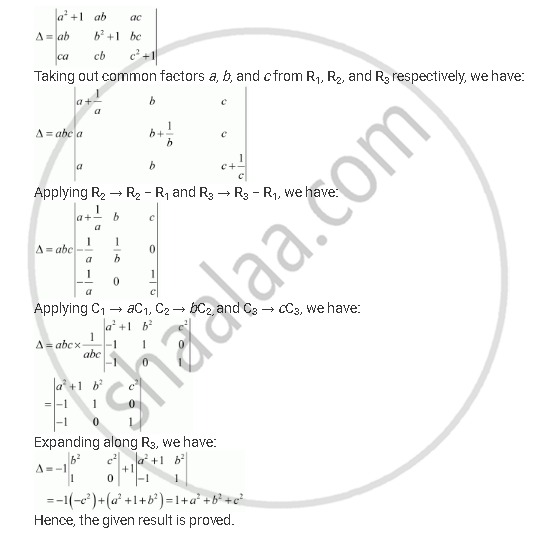Advertisements
Advertisements
प्रश्न
By using properties of determinants, show that:
`|(a^2+1, ab, ac),(ab, b^2+1, bc),(ca, cb, c^2+1)| = 1+a^2+b^2+c^2`
उत्तर

APPEARS IN
संबंधित प्रश्न
Using properties of determinants, prove that `|[2y,y-z-x,2y],[2z,2z,z-x-y],[x-y-z,2x,2x]|=(x+y+z)^3`
Using properties of determinants, show that ΔABC is isosceles if:`|[1,1,1],[1+cosA,1+cosB,1+cosC],[cos^2A+cosA,cos^B+cosB,cos^2C+cosC]|=0`
If ` f(x)=|[a,-1,0],[ax,a,-1],[ax^2,ax,a]| ` , using properties of determinants find the value of f(2x) − f(x).
Using properties of determinants, prove that
`|[b+c,c+a,a+b],[q+r,r+p,p+q],[y+z,z+x,x+y]|=2|[a,b,c],[p,q,r],[x,y,z]|`
By using properties of determinants, show that:
`|(1,a,a^2),(1,b,b^2),(1,c,c^2)| = (a - b)(b-c)(c-a)`
By using properties of determinants, show that:
`|(a-b-c, 2a,2a),(2b, b-c-a,2b),(2c,2c, c-a-b)| = (a + b + c)^2`
Using properties of determinants, prove that:
`|(alpha, alpha^2,beta+gamma),(beta, beta^2, gamma+alpha),(gamma, gamma^2, alpha+beta)|` = (β – γ) (γ – α) (α – β) (α + β + γ)
Using properties of determinants, prove that \[\begin{vmatrix}a + x & y & z \\ x & a + y & z \\ x & y & a + z\end{vmatrix} = a^2 \left( a + x + y + z \right)\] .
Using properties of determinants, show that `|("a" + "b", "a", "b"),("a", "a" + "c", "c"),("b", "c", "b" + "c")|` = 4abc.
Without expanding determinants, show that
`|(1, 3, 6),(6, 1, 4),(3, 7, 12)| + |(2, 3, 3),(2, 1, 2),(1, 7, 6)| = 10|(1, 2, 1),(3, 1, 7),(3, 2, 6)|`
Find the value (s) of x, if `|(1, 2x, 4x),(1, 4, 16),(1, 1, 1)|` = 0
Without expanding the determinants, show that `|("b" + "c", "bc", "b"^2"c"^2),("c" + "a", "ca", "c"^2"a"^2),("a" + "b", "ab", "a"^2"b"^2)|` = 0
Without expanding evaluate the following determinant:
`|(2, 7, 65),(3, 8, 75),(5, 9, 86)|`
Prove that `|(x + y, y + z, z + x),(z + x, x + y, y + z),(y + z, z + x, x + y)| = 2|(x, y, z),(z, x, y),(y, z, x)|`
Using properties of determinant show that
`|("a" + "b", "a", "b"),("a", "a" + "c", "c"),("b", "c", "b" + "c")|` = 4abc
Solve the following equation:
`|(x + 2, x + 6, x - 1),(x + 6, x - 1, x + 2),(x - 1, x + 2, x + 6)|` = 0
If `|("x"^"k", "x"^("k" + 2), "x"^("k" + 3)),("y"^"k", "y"^("k" + 2), "y"^("k" + 3)),("z"^"k", "z"^("k" + 2), "z"^("k" + 3))|` = (x - y) (y - z) (z - x)`(1/"x"+ 1/"y" + 1/"z") ` then
Answer the following question:
Evaluate `|(101, 102, 103),(106, 107, 108),(1, 2, 3)|` by using properties
Answer the following question:
Without expanding determinant show that
`|(x"a", y"b", z"c"),("a"^2, "b"^2, "c"^2),(1, 1, 1)| = |(x, y, z),("a", "b", "c"),("bc", "ca", "ab")|`
Prove that: `|(y + z, z, y),(z, z + x, x),(y, x, x + y)|` = 4xyz
The value of determinant `|("a" - "b", "b" + "c", "a"),("b" - "a", "c" + "a", "b"),("c" - "a", "a" + "b", "c")|` is ______.
The determinant `|("b"^2 - "ab", "b" - "c", "bc" - "ac"),("ab" - "a"^2, "a" - "b", "b"^2 - "ab"),("bc" - "ac", "c" - "a", "ab" - "a"^2)|` equals ______.
The number of distinct real roots of `|(sinx, cosx, cosx),(cosx, sinx, cosx),(cosx, cosx, sinx)|` = 0 in the interval `pi/4 x ≤ pi/4` is ______.
The value of the determinant `|(x , x + y, x + 2y),(x + 2y, x, x + y),(x + y, x + 2y, x)|` is ______.
If x, y, z ∈ R, then the value of determinant `|((2x^2 + 2^(-x))^2, (2^x - 2^(-x))^2, 1),((3^x + 3^(-x))^2, (3^x -3^(-x))^2, 1),((4^x + 4^(-x))^2, (4^x - 4^(-x))^2, 1)|` is equal to ______.
If a, b, c are the roots of the equation x3 - 3x2 + 3x + 7 = 0, then the value of `abs((2 "bc - a"^2, "c"^2, "b"^2),("c"^2, 2 "ac - b"^2, "a"^2),("b"^2, "a"^2, 2 "ab - c"^2))` is ____________.
`abs(("x", -7),("x", 5"x" + 1))`
Using properties of determinants `abs ((1, "a", "a"^2 - "bc"),(1, "b", "b"^2 - "ca"),(1, "c", "c"^2 - "ab")) =` ____________.
Let P be any non-empty set containing p elements. Then, what is the number of relations on P?
Let a, b, c be such that b(a + c) ≠ 0 if
`|(a, a + 1, a - 1),(-b, b + 1, b - 1),(c, c - 1, c + 1)| + |(a + 1, b + 1, c - 1),(a - 1, b - 1, c + 1),((-1)^(n + 2)a, (-1)^(n + 1)b, (-1)^n c)|` = 0, then the value of n is ______.
Without expanding determinant find the value of `|(10,57,107),(12,64,124),(15,78,153)|`
Without expanding determinants find the value of `|(10,57,107),(12,64,124),(15,78,153)|`
Without expanding determinants find the value of `|(10, 57, 107),(12, 64, 124),(15, 78, 153)|`
By using properties of determinant prove that `|(x+y, y+z,z+x),(z,x,y),(1,1,1)|=0`
Without expanding determinant find the value of `|(10,57,107),(12,64,124),(15,78,153)|`
By using properties of determinant prove that `|(x+y,y+z,z+x),(z,x,y),(1,1,1)|` = 0
if `|(a, b, c),(m, n, p),(x, y, z)| = k`, then what is the value of `|(6a, 2b, 2c),(3m, n, p),(3x, y, z)|`?
The value of the determinant of a matrix A of order 3 is 3. If C is the matrix of cofactors of the matrix A, then what is the value of determinant of C2?
